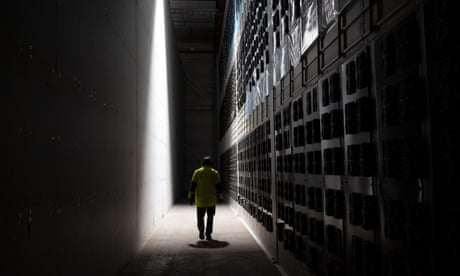- by foxnews
- 10 Jan 2025
Can bitcoin be sustainable? Inside the Norwegian mine that also dries wood
Can bitcoin be sustainable? Inside the Norwegian mine that also dries wood
- by theguardian
- 10 Feb 2022
- in technology

Hot air is being pumped into the 12 skips through bendy corrugated pipes curling out from the warehouse. Despite the snow, it will take a few days for the logs to be dried out, after which a local lumberjack, grateful for the free service, will take them away for sale.
The wood is being warmed by some of the so-called waste heat being emitted from thousands of stacked-high computer servers, known as miners, working away inside the warehouse. It is one of two such sites owned by the Norwegian company Kryptovault. The company expects its mining to account for just under 1% of the computing and process power in the global bitcoin network later this year.
Heat is an inevitable waste byproduct. Despite noise from ventilation fans so loud that the company had to spend about £1.5m on insulation after complaints from neighbours, the hot areas in the Hønefoss warehouse can reach 55C.
It has been described by some critics as greenwashing, but within a world that has until now been less than transparent over its activities, preferring secrecy over sympathy, this was a shift.
Advocates for bitcoin argue that it offers the opportunity to exchange value with someone instantly without using a third party such as a bank, without permission and virtually for free. They say it is being adopted at a faster rate than the internet in the 1990s, with El Salvador having become the first country to adopt it as legal tender, alongside the US dollar, in spite of misgivings from the International Monetary Fund.
Pettersen said people wanted bitcoin, and mining operations provided economic returns through tax and employment. Mining is further said to offer a way for countries with excess renewable energy supply from hydro, wind or solar power at certain times and seasons to make value of it within their own borders and without transfer costs. Estimates of what proportion of the energy used in mining is renewable vary from 25% to 57%.
The company is transitioning from older bitcoin miners to new ones shipped from China that are said to be three times more efficient. There will be plenty more waste heat to use. The company is in early talks to dry seaweed for a local firm. Pettersen says the narrative will change.
*Evidence of activity probably inflated owing to redirected IP addresses via the use of VPN or proxy services.
- by foxnews
- descember 09, 2016
'Opposite of a seat squatter': Flight passenger shares unexpected encounter with fellow traveler
A social media user is sharing her in-flight encounter with a passenger who was an "opposite" tale from the viral "seat squatter" stories. An etiquette expert weighs in.
read more





